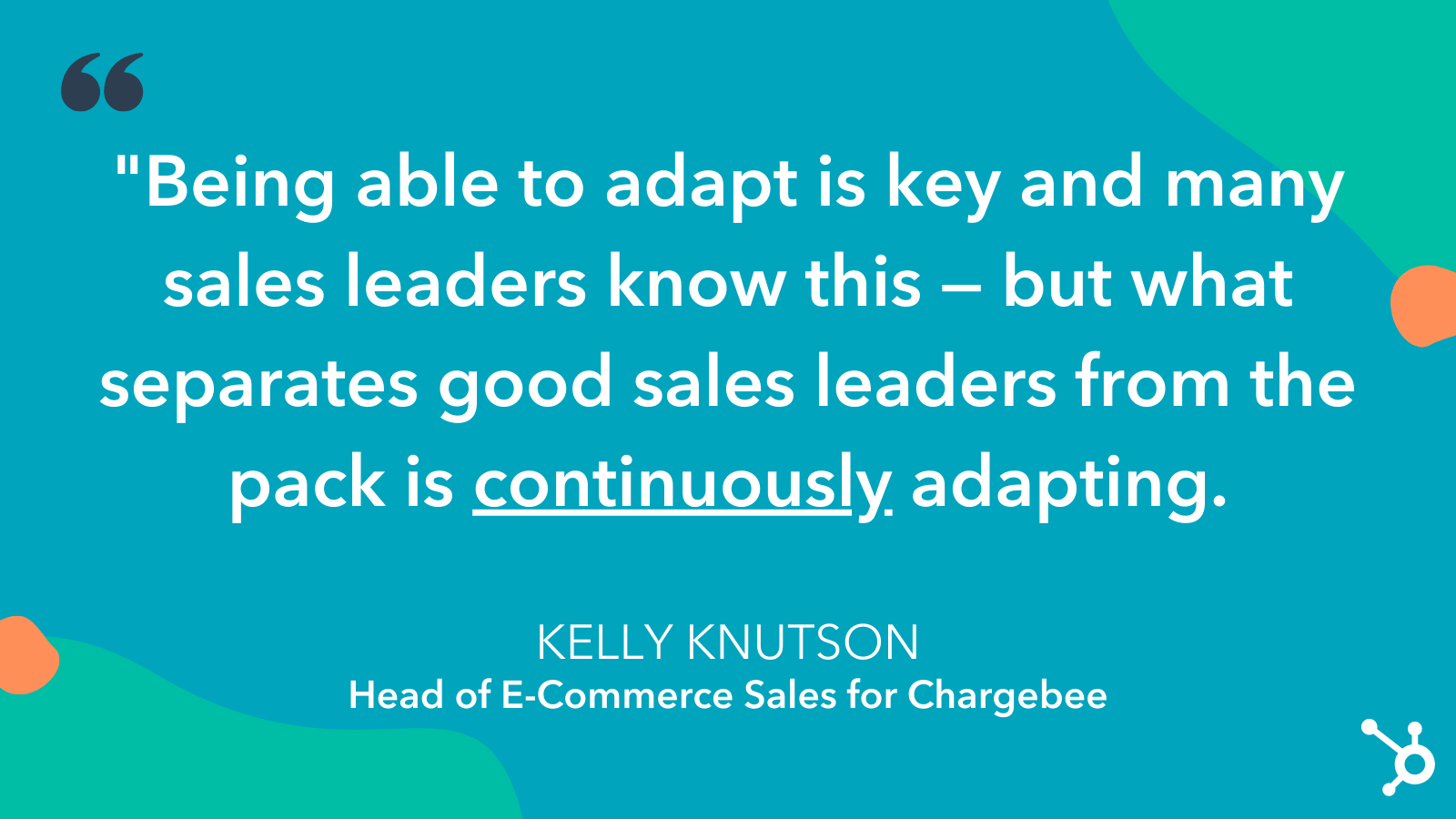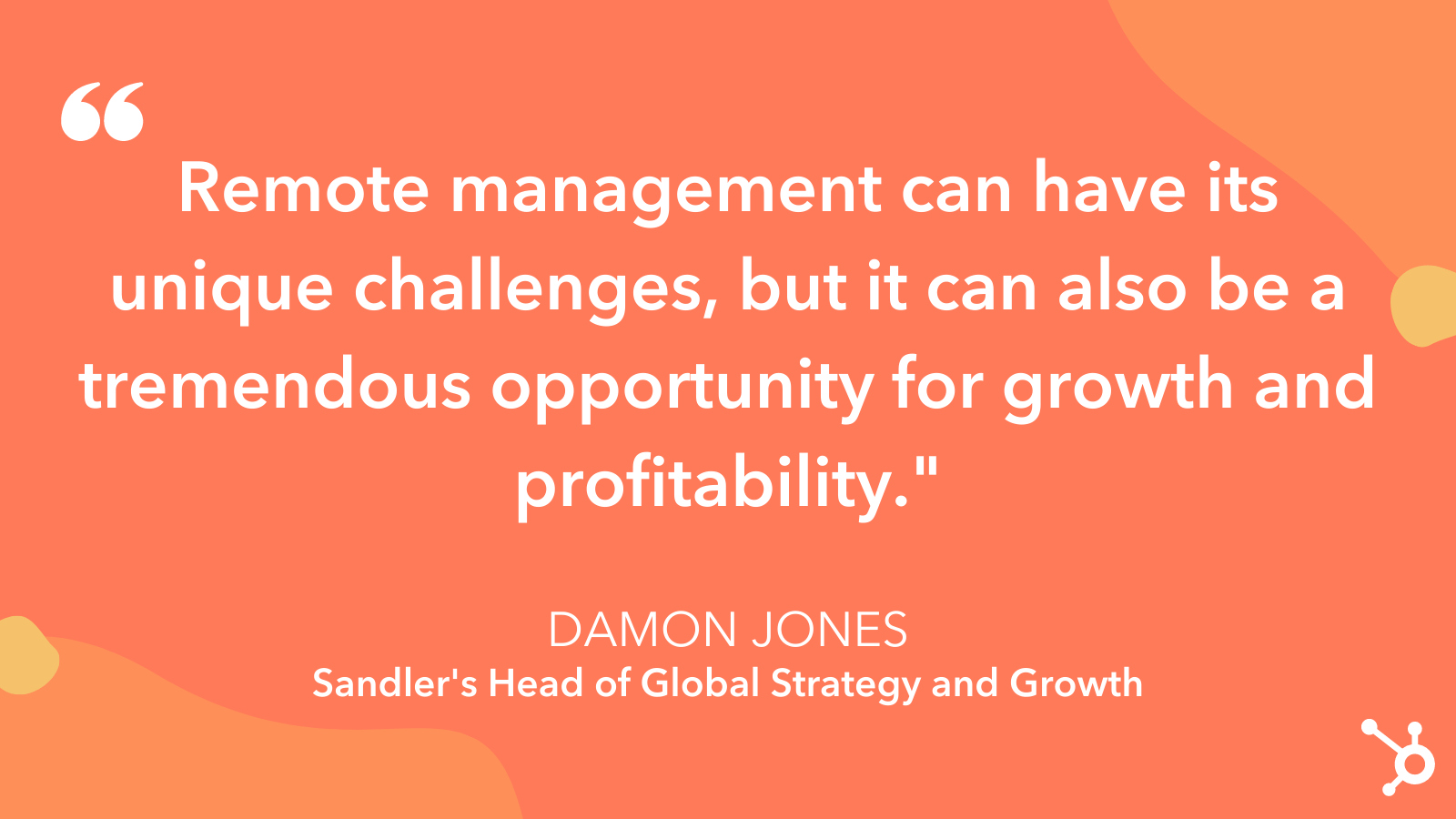In 2022, many employees now expect the option to work either entirely remote, or in a hybrid work environment.
In fact, 80% of workers say they’d prefer to work in a role with flexible work options over one without.
It makes sense: People have become accustomed to working from home, and have seen the benefits — including increased productivity and better work-life balance.
But working from home and leading from home are two different things.
Adjusting to leadership in a remote environment requires different skills than in person. Here, let’s explore what virtual leadership looks like, the skills required to succeed, and tips on excelling as a virtual sales leader, according to three remote managers.
What is virtual leadership?
Simply put, virtual leadership is a form of leadership in which a manager is tasked with coaching a partially or entirely remote team.
Virtual leadership looks very similar to in-person leadership: A virtual leader, for instance, still needs to motivate and inspire her team to achieve a shared goal.
However, virtual leadership will take a different approach than in-person leadership. A virtual leadership role will likely require more high-quality written communication skills, as well as even more flexibility and trust than in-person leadership.
Interested in what it takes to become a good leader? Take a look at How to be a Good Leader [Research + Expert Tips].
Let’s explore a few skills directly related to virtual leadership next.
Virtual Leadership Skills
There are some skills that any effective leader needs to hone, including:
- High emotional intelligence
- A growth mindset
- Strong communication skills
- Reliability
- Ability to give and receive feedback
- Decisiveness
However, virtual leaders need to focus on certain key traits that will help them succeed in a remote leadership role.
Skills that are particularly important for virtual leaders include:
- Strong written communication skills
- Flexibility and adaptability
- Ability to stay up-to-date on the latest workplace technologies (particularly when it applies to remote work)
- Empathy
A remote sales manager needs to be willing to alter their approach to suit the needs of each sales rep. For instance, perhaps one rep prefers in-the-moment feedback during video coaching sessions, while another rep needs the feedback delivered ahead of time, so they can process it before your meeting.
Additionally, communication skills are mandatory for any leadership role, and virtual management is no different.
As Kelly Knutson, Head of E-Commerce Sales for Chargebee, told me, “Communication is key to virtual leadership. ‘Drinking from the firehouse’ has become the norm, but we as sales leaders need to communicate with our teams every day. My practice has always been to create some assignments for my team so that I know how they are developing and what things we need to work on during our weekly 1-1’s.”
“For instance,” Knutson adds, “I might have an AE do some research on who he/she might think is the ideal customer for our business. Another assignment might be to create a list of our top competitors and share with me how we differentiate. By creating these little assignments, it ensures me either my AE is on track or needs additional support.”

Next, let’s dive into some development activities leaders can use to take their virtual management skills to the next level.
Virtual Leadership Development Activities
To foster key virtual leadership skills, there are plenty of development activities you can try.
Let’s explore four virtual leadership development activities. (These activities can be done virtually through a video conferencing tool like Zoom.)
1. Open mic night.
Split your leadership group into ‘audience’ and ‘performers’. The audience will then shout out a situation, which the performers need to act out together.
Skills to develop: Improv can be a fantastic opportunity for nurturing self-confidence, the ability to think quickly, and strengthening communication skills.
2. Describe your favorite leader.
In this activity, you’ll ask a group of leaders to reflect on the best and worst traits they’ve seen in leaders, and then describe the most effective leader they’ve ever had.
Skills to develop: This can help develop empathy and can encourage leaders to think about the types of behaviors they’ll want to model, as well.
3. Tallest tower.
Send each leader a basket with everyday items (or ask them to collect items around the house) — including toothpicks, uncooked pasta, etc. Then divide teams into groups, and ask them to build the tallest free-standing structure.
Skills to develop: This development activity helps encourage problem-solving and collaboration skills.
4. Center stage.
In this activity, you’ll want to ask one team member to play the role of an employee who requires constructive feedback (for instance, maybe they pretend to be an employee who’s recently missed a few meetings). Then, you’ll request each remaining participant to demonstrate a different leadership style — perhaps one person demonstrates a democratic leadership style, while another showcases a strategic leadership style.
Afterwards, discuss with the group which leadership approach felt most effective. Then discuss the ‘ideal’ leader’s behavior to each imaginary scenario.
Skills to develop: This activity can help develop empathy, as well as communication skills and collaboration. Plus, it enables leaders to begin thinking about their personal style – and how they might like to improve it.
Finally, let’s explore virtual and hybrid sales leadership tips, according to three sales managers.
Virtual & Hybrid Sales Leadership Tips
1. Create a culture in which open collaboration and communication is the norm.
One of the biggest challenges with virtual teams is communication.
It’s easy enough to schedule morning meetings in-person with your team, keep your office door open to encourage spontaneous conversation, and chat casually in the kitchen with colleagues to learn about their triumphs and setbacks.
But creating this same level of communication remotely requires more intentionality than it might in person.
As Dialpad’s Sales Enablement Program Manager, Chris Gell, told me, “According to a FlexJobs survey, 65% of employees want to continue to work remotely full-time post-pandemic.”
“Sales leaders have to adapt in order to maximize the success of their teams in a remote or hybrid world, where driving results and providing support need to be balanced.”
Gell adds, “In an area of business built upon camaraderie, one way sales managers can excel in their leadership roles is by building a remote-first team culture where team members can openly collaborate, share wins and productivity tips, and support each other no matter where they’re based. Sales managers should keep their lines of communication open and regularly ask for ideas and feedback around how they can better enable their teams.”
Fortunately, there are plenty of remote tools nowadays that you can leverage to create a more efficient work-from-home experience — including tools for scheduling meetings, sending internal announcements, and even for tracking team progress.
Gell adds, “With the flexibility that is brought by remote work, it is important for managers to set clear performance expectations with their teams and provide them support in order to meet those goals. Reinforcing open communication and learning from your teams is essential to driving success working remotely in sales.”
2. Use technology to be seen — not to hide.
Sandler’s Head of Global Strategy and Growth, Damon Jones, believes when leading remotely it’s vital sales managers remain transparent and easily accessible.
As he puts it, “The key to success in leading remotely is to use technology to be seen, not to hide. Effective sales leaders use video to build better rapport with their team, do virtual ride-alongs, and leverage technology like call analytics to find coaching moments with their team.”
Jones adds, “Ineffective managers use technology as a crutch. They hide behind emails, avoid difficult conversations, and manage results instead of proactively coaching the right behaviors. In today’s virtual world, it is easy to keep yourself busy checking dashboards and fighting fires in Slack or email, but effective sales leaders can focus themselves and their salespeople on the things that matter.”
For starters, you’ll want to ensure your team uses an up-to-date CRM. Additionally, take the time to plan thoughtful meetings with your team, including learning and development opportunities and personal one-on-one coaching sessions.

Jones also suggests sales managers use quick video messages or virtual meetings to avoid miscommunication and make remote sellers feel a part of a team. One tip? Use calendar invites to set an agenda ahead of time, including the purpose of the meeting and desired outcomes.
Jones says, “Proactive coaching to improve the selling skills of your team and prevent lost deals is much more efficient than responding to inbound requests. Listening to call recordings and diving into call analytics can help you spot problems, and more importantly, identify positioning statements to highlight for the rest of the team.”
3. Remain adaptable.
Kelly Knutson, Head of E-Commerce Sales for Chargebee, told me adaptability is a critical component for effective virtual sales leadership.
Knutson says, “Being able to adapt is key and many sales leaders know this — but what separates good sales leaders from the pack is continuously adapting. Pre-pandemic, for example, a company might rely on trade shows and conferences to generate a portion of their pipeline.”
Knutson continues, “Given there are fewer conferences right now and less foot traffic at those who hold them, sales leaders need to adapt and come up with new ways to fill the pipeline. Perhaps it’s a greater emphasis on social media or hosting your own virtual events, but then you’ll need to measure those results and likely adapt again.”
Ultimately, becoming a powerful and effective virtual leader will take time — as well as some trial and error. So be prepared to collect feedback from your remote direct reports often, and iterate on your processes and strategies as you learn what works best for your team.

![]()


